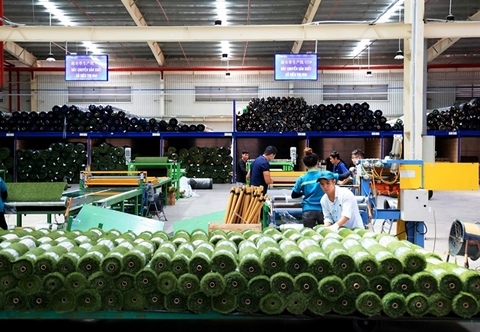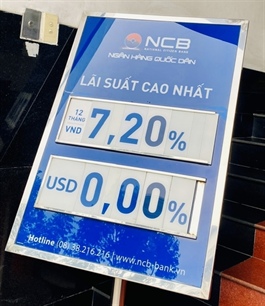Ministry proposes measures to implement global minimum tax initiative
Ministry proposes measures to implement global minimum tax initiative
The Government will propose policies regarding the global minimum tax to the National Assembly for discussion and approval in October, Prime Minister Phạm Minh Chính said at a recent meeting on law-making.

CCGrass Việt Nam, a foreign-invested company in Tây Ninh Province. The Ministry of Finance has proposed top-up taxes to be imposed in an effort to adapt to the global minimum tax initiative. — VNA/VNS Photo Hồng Đạt |
Introducing policies to come up with the global minimum tax was essential for Việt Nam to ensure tax revenue but remain attractive to foreign investors as many countries are adopting the initiative.
The global minimum tax of 15 per cent is part of a two-pillar initiative of the Organisation for Economic Co-operation and Development (OECD), Base Erosion and Profit Shifting (BEPS).
Việt Nam participated in 2017 and became the 100th member of BEPS, which now has 142 member countries.
The OECD/G20 Inclusive Framework on BEPS (IF), introduced in 2021, set the global minimum tax rate at 15 per cent for multinational enterprises (MNEs) with annual revenue of 750 million euros.
This means that countries that invest abroad will essentially apply a global minimum tax of 15 per cent, starting from 2024, to collect the difference from the actual tax rate.
Countries receiving foreign investment, including Việt Nam, are studying policies to complement the global minimum tax.
A set of incentives and support policies for new investments will be developed to ensure the competitiveness and attractiveness of the Vietnamese investment environment.
Chính said that the two solutions would be proposed to the National Assembly for approval at a meeting in October following a shortened process.
Top-up tax to be introduced
In the draft resolution of the National Assembly about tax policies to adapt to the global minimum tax, the Ministry of Finance proposed top-up taxes to be imposed which would help Việt Nam ensure tax revenue but remain attractive to foreign investors.
It is necessary for Việt Nam to issue regulations to adapt to the initiative, combat revenue leakages and remain attractive to investment, much like similar countries in the region that receive large amounts of foreign investment, the Ministry of Finance said.
The ministry proposed the introduction of Qualified Domestic Minimum Top-up Tax (QDMTT) and income inclusion rules (IIR).
QDMTT is a minimum tax that is included in the domestic law and is set to combat revenue leakages and profit–shifting activities.
It gives a country the right to charge top-up taxes on revenue from entities located in that country that were paying lower taxes.
If Việt Nam does not apply the global minimum tax, it still has to accept that other countries will apply it and have the right to collect top-up taxes on MNEs paying a lower tax rate than the global minimum tax for their investments in Việt Nam.
The imposition of QDMTT would help Việt Nam increase budget revenue, the ministry said.
The finance ministry cited statistics of the Ministry of Planning and Investment showing that Việt Nam has attracted investment from 142 countries and territories. Major investors in Việt Nam include the Republic of Korea, Japan and Singapore which altogether accounted for more than 50 per cent of the total FDI in Việt Nam as of December 20, 2022.
Việt Nam’s incentive policies on corporate income tax to attract FDI is considered attractive compared to other countries in the region, together with other advantages such as stable politics and abundant labour resources, which makes the country a capital magnet, the ministry said.
The ministry estimated that around 335 projects with registered capital from US$100 million operating in the processing and manufacturing industry in economic and industrial zones were enjoying corporate income tax rates lower than 15 per cent, including projects of Samsung, Intel, LG, Bosh, Sharp, Panasonic, Foxconn and Pegatron.
These projects accounted for just 1 per cent of the total number of FDI projects in Việt Nam but 30 per cent of the total FDI inflow, estimated at $131.3 billion.
Data from the General Department of Taxation showed that there were 619 MNEs with 1,017 subsidiaries in Việt Nam which had consolidated revenue above 750 million euros in 2021.
The tax authority estimated that about 112 MNEs in Việt Nam would be affected by the global minimum tax if it was applied from 2024.
Accordingly, if countries all applied global minimum tax from 2024, those where the headquarters of the parent companies were located would receive an additional tax difference of around $616 million in 2024.
Of the figure, the Republic of Korea would collect more than $452 million from the difference in tax from 18 MNEs with investments in Việt Nam and Japan $10.5 million from 36 MNEs.
In the draft, the ministry also proposed to apply IIR, which would allow the country to collect more tax on Vietnamese firms investing abroad through a member company in a foreign country earning a minimum revenue of 750 million euros and paying lower tax than the global minimum rate.
The ministry cited statistics that Việt Nam had 1,625 valid projects in foreign countries as of March 20 with a total investment of $21.9 billion, mainly in mining and agriculture industries.
























